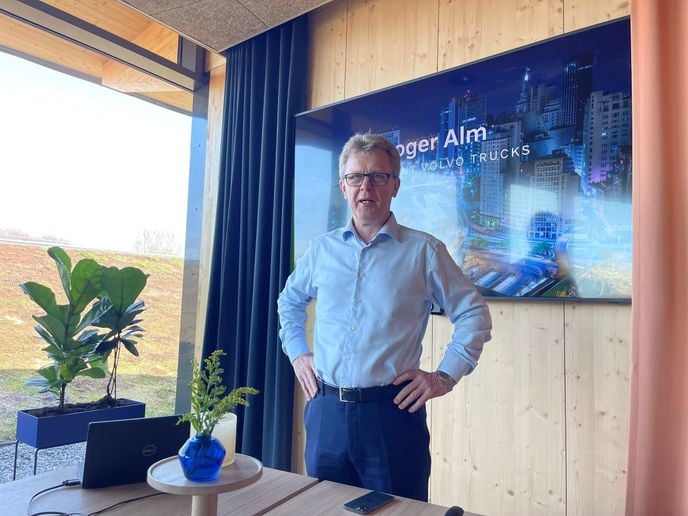Trucker Access › Forums › Diesel News › Volvo Trucks Meets the Emissions Moment – Fuel Smarts
- This topic has 0 replies, 1 voice, and was last updated 6 months, 2 weeks ago by
 EazyRiDer66.
EazyRiDer66.
-
AuthorPosts
-
May 11, 2024 at 10:15 am #19955
 EazyRiDer66Keymaster
EazyRiDer66Keymaster

Volvo Trucks President Roger Alm speaks to the media during the opening of Volvo World in Gothenburg, Sweden, on April 8,2024.
Volvo has taken a leadership position in the transition of heavy-duty commercial transport away from fossil fuels. Safety and the environment have been core guideposts at Volvo since the company’s founding. And the company clearly feels that it has risen to meet the moment. Everything in its culture, heritage and very DNA has seemingly been engineered to meet this historic moment.
And it’s not a stretch to say that Roger Alm has Volvo in his DNA.
Today, Alm is the man at Volvo. He is executive vice president of the Volvo Group and president of Volvo Trucks worldwide. It’s a journey that began 35 years ago when he started as a lowly technician at the massive global company he now runs.
During a visit to Volvo’s hometown of Gothenburg, Sweden, in early April, North American journalists sat down with Alm to hear his thoughts on how that transition is going and how Volvo is working to assist in the journey.
A Million-Truck Mission to Net Zero
Volvo calls this global emissions effort The Road to Net Zero. Alm noted that since its inception in 2019, Volvo has taken massive strides toward that goal. This includes huge investments in new technologies, new products, new companies, and new joint ventures. It’s a journey that even includes collaborative research and development partnerships the Volvo’s biggest global competitors, like Daimler Trucks and Traton.
And time is of the essence. Alm noted that by the terms of the Paris Agreement, of which Volvo is a signee, global truck and engine OEMs have agree to decarbonize the planet’s transportation sectors by 2025 — a mere quarter of a century from now.
There are 1.2 million Volvo trucks on the road today, working in 150 countries around the globe. And that entire population of trucks will have to be completely replaced in that time.
“The life of a truck is about 10 years,” Alm noted. “That means that by 2040, every truck Volvo produces will need to be a zero-emission vehicle in order to reach that goal.”
And Volvo is rising to meet the moment, Alm said. He pointed out that Volvo delivered 295,000 trucks worldwide in 2022 and 2023.
“Those were record years for Volvo,” Alm added. “Our global product equaled the number of all trucks sold annually in North America.”
Today, Volvo has close to 1 million connected trucks on the road. And Alm said the company is riding high following its biggest product launches ever.
“We have just introduced the new VNL in North America,” he said. “That is a truck designed to change everything. And at the same time, we launched a new range of cabover trucks here in Europe.”
Volvo designers took advantage of new length regulations for heavy trucks in Europe to design new cabover models with enhanced aerodynamics.
“These trucks feature reduced fuel consumption and CO2 emissions,” Alm noted. “In 2018 we were able to reduce fuel consumption by 18% in our cabover trucks with enhanced aerodynamics. And now we have an additional 5% reduction. And all of these are steps on the road to net zero.”
The new Volvo FM model cabover, launched earlier this year, is the company’s first truck to be designed from the ground up as a pure battery-electric vehicle.
And — seemingly at odds with the company’s quest toward net zero —Volvo has launched a new 17-liter diesel engine for Europe. The new engine churns out an astonishing 780 horsepower. But it is lighter than Volvo’s previous 16-liter high-horsepower engine, emits fewer emissions and uses less fuel, to boot.
All Options on the Table
Setting the tone for the remainder of our visit to Gothenburg, Alm made it clear that internal combustion engines will remain an important part of Volvo’s net zero strategy for many years to come.
“In the short term, this will include engines that run on diesel fuel,” he said. “Later, there will be clean-fuel versions running on natural gas and eventually hydrogen.”
Globally, Alm noted, the transportation of goods and people accounts for 14% of all C02 emissions. And 7% — half — come from road transportation. Which is why Volvo has pushed hard to get electric trucks to the market and available for sale today.
“We are making a difference by doing so,” he added. “In 2019 Volvo had two battery-electric truck models. The following year, we launched the VNR electric in North America. At the moment Volvo now offers six electric truck models. And that total will grow to eight later this year.”
In the short term, Alm said, it will battery-electric trucks that drive the transition to net zero. To date, he said, Volvo electric trucks have logged more 35 million kilometers on public roadways.
“We have seen transformation before,” Alm noted. “There are regulations now driving us. And there will surely be other legislation as well. But we have our targets now and we are moving ahead.
“How fast will it go? That remains to be seen. But at Volvo, we hare committed to our emissions goals: 50% of our new trucks will be zero-emission vehicles by 2030. And 100% of our new trucks will be zero emission by 2040. And our entire global population of new trucks will will be zero-emission vehicles by 2050.”
-
AuthorPosts
- You must be logged in to reply to this topic.